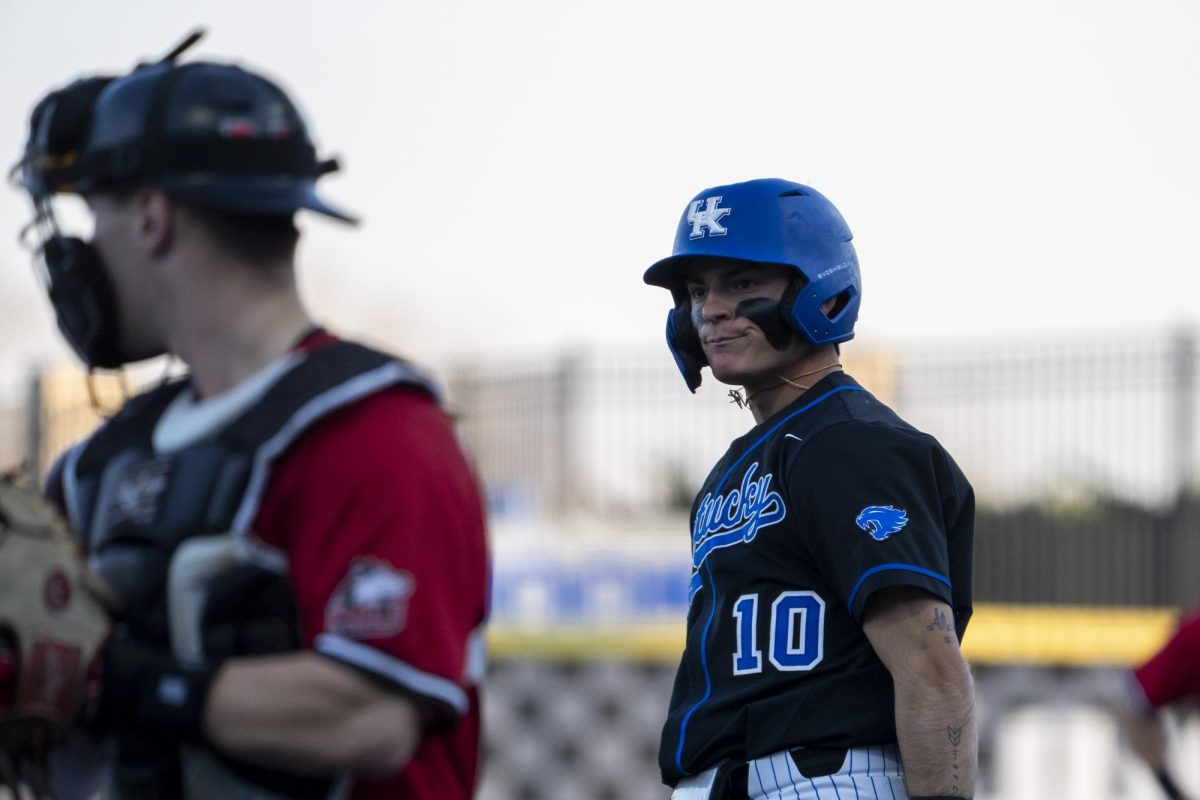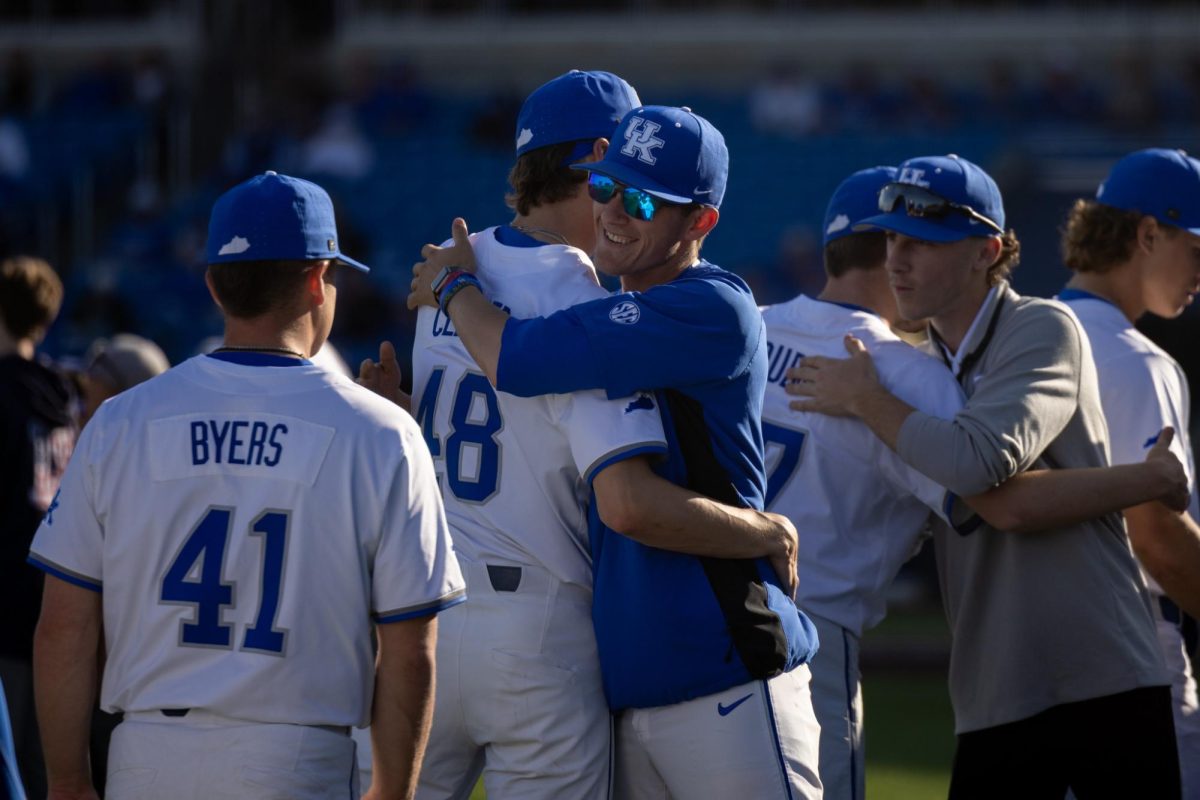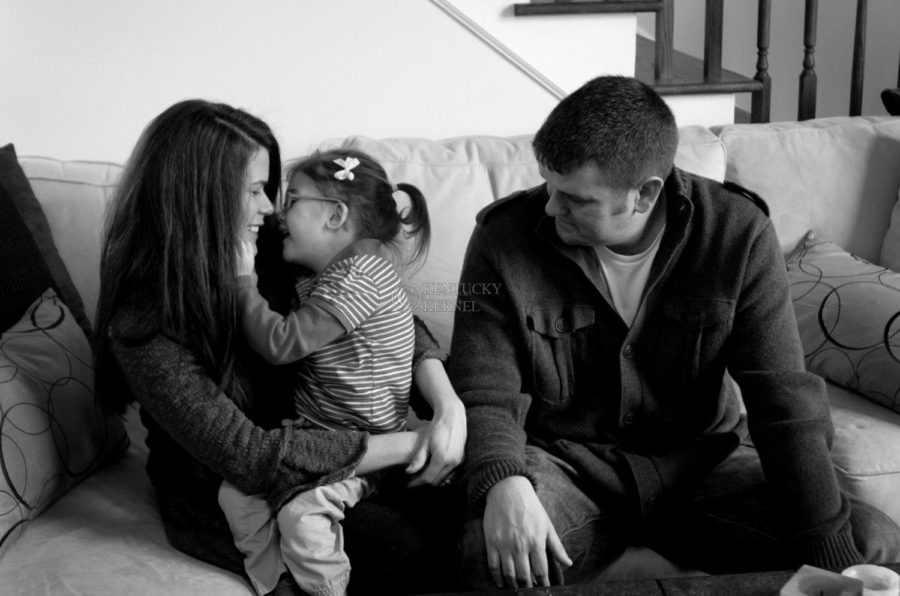The heart of the matter
April 7, 2010
Abby Martin sets her gaze intently on the glowing TV screen. Clad in pink play clothes and a matching bow, she claps her hands and squeals for one of her favorite cartoon characters, “The Mighty B.” And while Abby rocks in excitement, it is hard to imagine her as a fragile infant.
But the scars Abby wears are not from the usual 5-year-old antics of scraping knees on the playground. Abby’s scars are from multiple life-saving surgeries beginning when she was only hours old.
A rocky beginning
Most parents spend the first 70 days of their child’s life in a whirlwind of diapers, bottles and rocking chairs.
Farrah and Michael Martin spent the first 70 days wondering if their child would make it out of the Kentucky Children’s Hospital alive.
Abby, now 5 years old, was born with CHARGE, a syndrome consisting of a myriad of medical conditions. Abby has colobomas in her eyes, impairing her vision; she is deaf in one ear, she has a heart defect and a blockage in her stomach. She does not speak and eats through a tube. She can walk, with help from her parents holding onto her or by using a walker.
Farrah Martin knew there was a problem during her pregnancy. Although the parents-to-be were aware of a heart defect in their unborn child, they were not prepared for all the complications that would follow.
The day before Abby was born, she was not moving.
“I went to bed, slept all night and knew something was wrong when I woke up and had a good night’s sleep because that didn’t happen very often,” Farrah said.
When the doctor saw Abby’s heart rate was dropping, the decision was made to get Abby out quickly. Forty-five minutes later, she was born by C-section.
“When she was born, we found out there was a little more to it than just the heart defect and stomach problem,” Farrah said. “She had surgery on her heart when she was 12 hours old.”
Although Abby was born at Central Baptist Hospital, her parents took her to Kentucky Children’s Hospital for the surgery. Dr. Timothy Bricker, chairman of pediatrics and physician in chief of Kentucky Children’s Hospital, said children like Abby are moved to KCH because of the expertise the doctors can provide.
Bricker said CHARGE is a combination of anomalies, and cases like Abby are seen maybe once a year at the Children’s Hospital. Because of the complexity of the disease, Bricker said KCH is the best place for children like Abby to receive treatment.
“There’s a group of specialists at the nursing level and physician level that are very accomplished and very well trained at dealing with extremely ill children,” Bricker said. “The problem with a disease like this is that it involves so many different organ systems. In addition to needing neonatologists, you may need kidney specialists, heart and heart surgery specialists, a number of specialists that require the expertise of a children’s hospital.”
A personal touch
In the first 70 days of Abby’s life, she had 10 surgeries. The Martins spent more time in the hospital than their own home. Farrah said the hospital staff became a source of comfort aside from its medical expertise. The Martins stayed with Abby constantly at first. Farrah said she and Michael would pull a tag-team routine allowing one parent to go home and shower while the other was with Abby.
“You’re there so frequently that the staff there becomes your friends and your family,” she said. “The nurses, especially, because you see and spend more time with them than you do the doctors or the surgeons.”
Abby spent her first Halloween in the hospital, but Farrah wanted her daughter to have a costume. A nurse made Abby a costume, and the staff changed Abby’s clothes, dressed her up and put bows in her hair — which helped Farrah realize the nurses treated Abby as if she were their own.
“I think it was really crucial to us when we realized that we had such trust in the nursing staff that we could come home,” she said. “ … We gained such trust in the nursing staff that we knew they were going to take care of her. They would not hesitate to call us if anything went wrong and we needed to get back to the hospital in the middle of the night, and after a few weeks, we started spending the night at home, which was great.”
That personal connection is something that can be expected from nurses and doctors at KCH, Bricker said. The staff behaves toward the families of the sick children as though they are family, he said.
“There really is an expectation that we will provide not only the very best for the children but the best for their family,” Bricker said. “ … The hospital means the people of the hospital, and it’s absolutely committed to improving the lives and health of Kentucky’s children and to providing a more optimistic future for their families and that includes everything we do.
“We’re the best children’s hospital for miles and miles and miles.”
Looking forward
Abby has come a long way since her arrival into the world. She bustles around in her walker, picking up books with her feet, a natural curiosity taking over. She attends school with other children, with an interpreter to help her sign.
Abby has one more major heart surgery planned, but the Martins are unsure when it will take place. Michael Martin said each year the family visits the doctor, and he knows at some point he will be told, “It’s time.”
Farrah Martin looks at her daughter every day with an appreciation that she is alive and happy. Although there are many things making Abby different from other children her age, there are creative ways to adapt. Abby requires targeted learning, like to prepare her for a birthday party.
“Her 2- and 3- and probably her 4-year-old birthdays, it was a two-week long process of planning,” Farrah Martin said. “We had pretend birthday parties for stuffed animals because she didn’t understand the concept. She didn’t get the fact that it was going to be her birthday and you couldn’t just tell her about it.”
By getting out the balloons and the cake to practice, Farrah Martin said Abby can be better prepared to enjoy her birthday parties. It is something not required of other children, but Farrah is just thankful Abby has the ability to gain understanding.
Michael Martin said he still struggles with his daughter’s situation, but like Abby, he improves every year. Because Abby is fed through a tube, Michael Martin said it hits him when he sees other children eating ice cream or having fun at a restaurant. Yet because of the complexity of CHARGE, there is no road map for what Abby might accomplish.
“With other disorders, they are so popular, and there are so many children like that you sort of have an idea of ‘will my child ever be able to live by herself, or will my child ever be able to drive a car or go to prom or eat by mouth or anything?’ ” Michael Martin said.
The majority of children born with CHARGE are totally blind and totally deaf. The Martins have encountered children with CHARGE at conferences. Some are almost in a vegetative state, but one child went on to college.
“It’s great to know there’s hope that Abby will walk and hope that Abby will talk and hope that Abby will eat by mouth, but then there’s also going back to the unknown,” Michael Martin said. “We just don’t know.”
But no matter what the future holds for Abby, Farrah knows the Kentucky Children’s Hospital will always be a part of her family’s life in a bittersweet way.
“Still, when we get off the elevators on the fourth floor, it’s a feeling of relief we aren’t there anymore,” Farrah Martin said. “But at the same time, we know we spent the first 10 weeks of our daughter’s life there.”



























































































































































